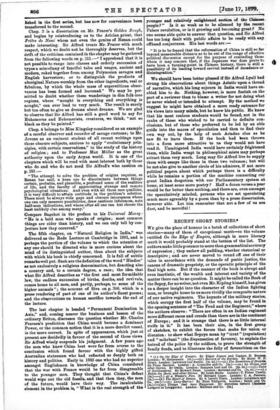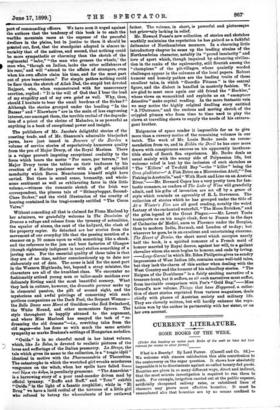RECENT SHORT STORIES.*
WE give the place of honour in a batch of collections of short stories—many of them of exceptional merit—to the volume entitled On the Edge of Empire, although in mere literary merit it would probably stand at the bottom of the list. The authors make little pretence to more than grammaticalaccuracy of expression ; they eschew all padding, whether rhetorical or descriptive ; and are never moved to round off one of their tales in accordance with the demands of poetic justice, the canons of dramatic propriety, or the operatic principle of the final high note. But if the manner of the book is abrupt and even inartistic, of the wealth and interest and variety of the matter there can be no question. It might be called the Book of the Sepoy, for no writer, not even Mr. Kipling himself, has given us a deeper insight into the character of the Indian fighting man, or brought home to us more vividly the composite nature of our native regiments. The keynote of the military stories, which occupy the first half of the volume, may be found in the opening sentence of "The Feud and the Regiment," where the authors observe : " There are often in an Indian regiment more different races and creeds than there are in the continent of Europe ; and it is strange that there is so little internal strife in it." It has been their aim, in the first group of sketches, to exhibit the forces that make for union or disunion : to show what Sepoys mean by "izzat " (reputation) and " mihrbani" (the dispensation of favours), to explain the hatred of the police by the soldiers, to prove the strength of family fends, and to illustrate the folly of favouritism on the (1.) On the Edge of Empire. By Edgar Jepson and Captain D. Beamea. London: W. Heinemann. [69.]--(2.) Bearers of the Burden. By Major W. P. Drury. London : Lawrence and Sullen. [3.s. ad.]—(3.) The Dominion of Dreams. By Flona Macleod. London : A. Constable and Co. [6s.]—(4.) La Strega, and other Stories. By Onida. London : Sampson Low and Co. [33. Gd.]—(5.) Tales of Northumbria. By Howard Pease. London : Methuen and Co. [3s. 6d.]—(C Rithin the Devil, and other Stories. By Louis Becke. London : T. Fisher LTnwln. [6s.]—(7.) At a Winter's Fire. By Bernard Capes. London: C. A. Pearson. 16s.]—(3.) The Heart of Denise. By S. Levett Yeats. London: Longmans and Co. [Ss.]—(9.) Loup.Garou! By Eden Phllipotts. London : Sands and Co. [6s.]--(10.) Things that hare Happened. By Dorothea Gerard (Madame Longard he Longgarde). London : Methuen and Co. [6a.]
part of commanding officers. We have seen it urged against the authors that the tendency of this book is to exalt the warlike mountain races at the expense of the peaceful dwellers in the plains, but in justice to them it should be pointed out, first, that the standpoint adopted is almost in- variably that of the natives, and second, that nothing could be more sympathetic or charming than the sketch of the regimental " babu," " the man who greases the wheels, the man who, "though an Indian, lacks the utter selfishness of his race," and will "attend to the affairs of strangers, even when his own affairs claim his time, and for the most part out of pure benevolence." For simple pathos nothing could be finer than the sketch of Allah Dad, the stupid but devoted Rajpoot, who, when remonstrated with for unnecessary exertion, replied : " It is the will of God that I bear the load of my stupidity and of my own grief as welL Why, then, should I hesitate to bear the small burdens of the Sirkar P" Although the stories grouped under the heading " In the Bazaar" and " Elsewhere " are in the main of less engrossing interest, one amongst them, the terrible recital of the degrada- tion of a priest of the shrine of Mahadeo, is as powerful as anything in a book of exceptional power and insight.
The publishers of Mr. Jacobs's delightful stories of the coasting trade, and of Mr. Shannon's admirable bluejacket yarns, have just issued in Bearers of the Burden a volume of service stories of superlatively humorous quality from the pen of Major Drury, of the Royal Marines. There is a vulgar proverb imputing exceptional credulity to the force which bears the motto " Per mare, per terram," but Major Drury turns the tables on their traducers by his creation of a Marine pensioner with a gift of splendid mendacity which Barou Munchausen himself might have envied. But there is sound sense, humanity, and whole- some sentiment as well as exhilarating farce in this little volume,—witness the romantic sketch of the Irish war correspondent, the piteous tale of " Shinnybeggar, Second- Class Stoker," and the vivid illustration of the cruelty of hoaxing contained in the tragi-comedy entitled " The Cocoa Valve."
Without conceding all that is claimed for Fiona Macleod by her admirers, we gratefully welcome in The Dominion of Dreams a refuge and release from the tyranny of actualities, the squalor of slums, the cant of the kailyard, the clash of the property rapier. So detached are her stories from the movement of our everyday life that the passing mention of a steamer on p. 70 comes upon us with something like a shock, and the reference to the jam and boot factories of Glasgow (though righteously indignant in tone) strikes something of a jarring note. For the essential quality of these tales is that they are of no time, neither conscientiously np to date nor elaborately out of date. The scene is laid for the most part in the Western Highlands, but, beyond a stray minister, the characters are all of the humblest class. We encounter no fashionably attired young men or tailor-made maidens ever delicately flirting amid the most beautiful scenery. What they lack in culture, however, the dramatis persona, make up in elemental passion, the gift of second sight, and the mysterious and awful privilege of consorting with such perilous companions as the Dark Fool, the Serpent Woman— the Belle Dame sans Merci of Gueldom—the Red Swineherd, the White Hound, and other momentous figures. The style throughout is happily attuned to the argument, and where Miss Macleod has essayed the task of " re- dreaming the old dreams"—i.e., rewriting tales from the old sagas—she has done so with much the same artistic sympathy as marks Brahms's settings of Hungarian melodies.
"Oujda" is in no cheerful mood in her latest volume, which, like Le Selve, is devoted to realistic pictures of the loves and sufferings of the Italian peasantry. La Strega, the tale which gives its name to the collection, is a "tragic idyll" identical in motive with the Pliarmace2dria of Theocritus. The catastrophe in which the wretched girl wreaks murderous vengeance on the witch, when her spells have failed WAXElY • :-.-671 or✓,ua r s 4.141PCC, is peculiarly gruesome. " The Anarchist" is a harrowing story of a poor road-mender driven mad by official tyranny. " Ruffo and Ruff," and " Toto " exhibit " Oujda " in the light of a fanatic zoophilist ; while in "El Brug " we have a lurid recital of the tortures of a little girl who refused to betray the whereabouts of her outlawed
father. The volume, in short, is powerful and picturesque but grievrisly lacking in relief.
Mr. Howard Pease's new collection of stories and sketches worthily maintains the reputation he has gained as a faithful delineator of Northumbrian manners. In a charming little introductory chapter he sums up the leading strains of the Northumbrian character, notably its "proud insularity" and love of sport which, though impaired by advancing civilisa- tion in the ranks of the squirearchy, still flourish among the "champions" of the pit-villages, whose quaintly worded challenges appear in the columns of the local papers. Robust humour and homely pathos are the leading traits of these excellent tales, in which " Geordie Pitman " is the central figure, and the dialect is handled in masterly fashion. We are glad to meet once again our old friend the " Heckler," whose views on womenkind and exploits as an " ammytoor detective" make capital reading. In the more fantastic vein we may notice the highly original duelling story entitled "A l'Outrance," and the curious and moving sketch of the crippled pitman who from time to time used to play the clown at travelling shows to supply the needs of his extrava- gant brother.
Exigencies of space render it impossible for us to give more than a cursory notice of the remaining volumes in our batch. The work of Mr. Louis Becke needs no recom- mendation from us, and in Riddn the Devil he has once more drawn with conspicuous success on his apparently inexhaus- tible stock of South Sea experiences. Mr. Becke deals as usual mainly with the seamy side of Polynesian life, but welcome relief is lent by the inclusion of such sketches as " The Killers' of Twofold Bay "—the " killer " being the Orca gladiator—" A Fish Drive on a Micronesian Atoll," " Sea Fishing in Australia," and " With Hook and Line on an Austral River."—Mr. Bernard Capes has a very pretty turn for fan- tastic romance, as readers of The Lake of Wine will gratefully admit, and his gifts of invention are set off by a grace of style which reminds us agreeably of R. L. Stevenson. The collection of stories which he has grouped under the title of At a Winter's Fire are all good reading, notably the weird fantasy of the enchanted waterfall, " The Moon Stricken," and the grim legend of the Great Plague.—Mr. Levett Yeats transports us on his magic cloak, first to France in the days of Catharine de' Medici, anon to Florence under the Borgias, then to modern India, Burmab, and London of to-day ; but wherever he goes, he is an excellent and entertaining cicerone. The Heart of Denise, the short novel which occupies nearly half the book, is a spirited romance of a French maid of honour married by Royal decree, against her will, to a gallant chevalier whom she soon begins to honour, and ends by loving.
Loup-Garou! in which Mr. Eden Phillpotts gives us sundry impressions of West Indian life, contains some well-told tales, but they lack the charm of this author when dealing with the West Country and the humour of hie schoolboy stories. " The Enigma of the Doubloons" is a fairly exciting narrative of a treasure-hunt, but it suffers, as all such narratives must suffer, from inevitable comparison with Poe's "Gold Bug."—Miss Gerard's new volume. Things that have Happened, a collec- tion of short stories reprinted from various magazines, deals chiefly with phases of Austrian society and military life. They are cleverly written, but will hardly enhance the repu- tation won by the author in partnership with her sister, or on her own account.







































 Previous page
Previous page